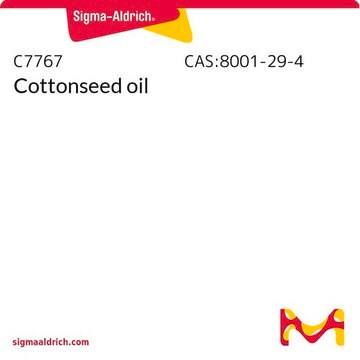Recommended Products
form
liquid
refractive index
n20/D 1.4795
density
0.93 g/mL at 25 °C ()
General description
Linseed oil is a natural triglyceride and a well known drying oil. Drying of the triglyceride mainly leads to the oxidation of the unsaturated fatty acid segments and polymerization. Oxidative degradation studies of linseed oil show hardening and oxidation of alkylic sections followed by partial fragmentation of the triglyceride structure.
Application
Linseed oil filled urea–formaldehyde resin microcapsules may be used to fix cracks in paints/coatings. This linseed oil is processed to create a product that is more suited for many uses (such as paint, to name one), in terms of ″drying time.″
Storage Class Code
10 - Combustible liquids
WGK
WGK 3
Flash Point(F)
Not applicable
Flash Point(C)
Not applicable
Personal Protective Equipment
dust mask type N95 (US), Eyeshields, Gloves
Certificates of Analysis (COA)
Search for Certificates of Analysis (COA) by entering the products Lot/Batch Number. Lot and Batch Numbers can be found on a product’s label following the words ‘Lot’ or ‘Batch’.
Already Own This Product?
Find documentation for the products that you have recently purchased in the Document Library.
Customers Also Viewed
Preparation and characterization of microcapsules containing linseed oil and its use in self-healing coatings.
Suryanarayana CK, et al.
Progress in Organic Coatings, 63(1), 72-78 (2008)
Drying and oxidative degradation of linseed oil
Lazzari M and Chiantore O
Polymer Degradation and Stability, 65(2), 303-313 (1999)
Drier influence on the curing of linseed oil.
Mallegol J, et al.
Progress in Organic Coatings, 39(2), 107-113 (2000)
Wan Maznah Wan Ishak et al.
Drug delivery and translational research, 9(2), 418-433 (2018-04-19)
Wound healing is a physiological event that generates reconstitution and restoration of granulation tissue that ends with scar formation. As omega fatty acids are part of membrane phospholipids and participate in the inflammatory response, we investigated the effects of omega-3
Pyrolysis of pine wood in a slowly heating fixed-bed reactor: Potassium carbonate versus calcium hydroxide as a catalyst
Wang Z, et al.
Fuel Processing Technology, 91(8), 942-950 (2010)
Our team of scientists has experience in all areas of research including Life Science, Material Science, Chemical Synthesis, Chromatography, Analytical and many others.
Contact Technical Service







